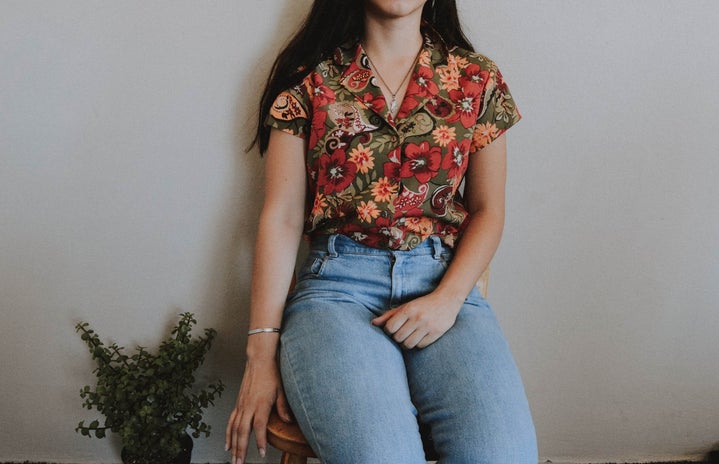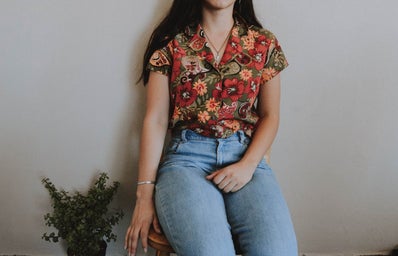I’ve never been the girl with a flat stomach. I’ve never had the magazine “bikini body.” I’ve never had a gap between my thighs. I stood a foot taller than everyone in my fourth-grade class picture. I started having to wear a bra before any of the other girls my age. I was ten the first time I was called fat. The size of my jeans has been double digits since I was thirteen. My whole life, I’ve been extremely aware that my body did not meet societal beauty standards.
Over the course of my four years in high school, I gained a significant amount of weight, particularly during my senior year. After graduating from the boarding school I attended, I came home for summer and had to buy all new shorts. I spent a lot of time and energy trying to convince myself that I was fine with how I looked––but I wasn’t. I filled my social media feeds with accounts of women like Megan Crabbe (@bodyposipanda) and plus-size model Ashley Graham (who in 2017 was the first plus-size model to make the highest-paid model list and the first plus-size cover star of Sports Illustrated swimsuit issue in 2016). I tried to drown out the constant same-body type messages and images that I had been bombarded with my whole life––but even though I filtered the accounts I followed, the magazines I read and tried to listen to music with positive messages, there was still the silent moments of simply existing in my body being left alone with my negative thinking.
As the first semester of my freshman year of college progressed, so did my negative obsession with my body. I was distracted in class, anxious that everyone was looking at me and judging me. I was terrified that the first label people associated when they saw me was fat––because that was the first label I associated with my reflection every time I looked in the mirror. I knew things were getting out of control when I couldn’t enjoy Thanksgiving dinner––barely eating my first serving because eating made me so anxious to the point of tearing up. Being fed up with how I was feeling, I decided to try cutting as many carbs out of my diet as possible––but carbs quickly turned into whole meals. I went whole weekends with only eating one meal. By Christmas, I realized I had no idea how to eat food in a normal way, and I knew I was at the start of an eating disorder.
The emotions I had around food needed to be addressed, but I knew I had to take concrete action. I started working with a nutritionist who had a personal disordered-eating background and had helped clients recovering from disordered eating. I learned how many carbs, fats, and proteins my body needed (Spoiler: carbs aren’t evil and your brain actually needs them to function). I learned to listen to my body. I learned to control what I ate in a positive way, and not let what I ate control me. Some people would call it a diet, but I let myself enjoy “junk foods”––something I had never let myself do before without feeling guilty. Before working with a nutritionist, I would binge eat and then feel guilty, starving myself until the point that my body would be so famished that once I allowed myself to eat again, I couldn’t control my intake (since my body interrupted my eating habits as if I was living in a famine and was making me overeat to make sure I survived the next “famine” period). Everything about my “diet” was a welcomed and positive change in how I took care of my body and how I viewed my eating habits––it was healthier than any way I had ever eaten before.
But the other result of getting control over how I viewed food and fueled my body was that I lost forty pounds in the span of six months––which is a drastic weight loss, especially for that span of time. People began commenting on it, telling me how good I looked. I appreciated the compliments but I never wanted to talk about it. I did have a goal weight in mind when I started working with the nutritionist, but it was because I didn’t feel comfortable at my starting weight. A big message of the body positivity movement is finding the weight that you feel most “you” at. I never felt like myself at my heaviest weight. I felt trapped. Though I felt that if I told people about my intentional weight loss they would view me as a fraud for ever preaching the message of body positivity. Yes, I had lost weight, but I didn’t believe that everyone who wasn’t a straight size needed to. I still don’t believe that. I lost weight because it was a side-effect of learning how to properly eat in the way that worked for my body. I lost weight because it gave me the body that felt like myself in. Weight loss was a result of learning how to listen to my body––a result of learning how to love my body. The goal of the body positivity movement is to help people love their bodies––but I suddenly didn’t feel like I had a place in the movement because I could now be considered skinny.
The body positivity movement got me through a lot. It got me through high school when I didn’t have the tools or ability to change the way I ate due to limited options in my boarding school cafeteria. It taught me a lot and it was what made me get help in the early stages of my eating disorder. Though now in a lot of ways I feel betrayed by the movement. I feel that just because I lost weight my decade long struggle with my body isn’t valid in the eyes of the movement. Somehow it seems that now that I wear a size 8 pair of jeans I can’t talk about my experience when I wore a size 14/16. But the body positivity movement is meant to be for ALL bodies. It’s suppose to embrace the changes of bodies as people change as individuals mentally and emotionally. I’ve lived longer hating my body than I have loving it, and that is valid––something that I feel the body positivity movement doesn’t always acknowledge. The people with “after” photos still remember their experience as the “before” photo, and there was a journey between those photos that should have a place in the movement. I have friends who are size 0 who hate their bodies, and their struggle is just as valid as me hating my body at my heaviest weight. If we are going to change the messaging like the ones that ten-year-old me took to heart, then we can’t exclude any experience or journey towards a healthy relationship with one’s body.


